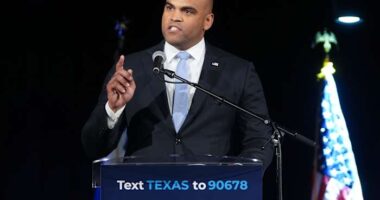
Conservatives are calling it the natural next step in Trump’s promise to shut down the Education Department and give more power to states.
Several Republican governors have urged the Trump administration to loosen restrictions on federal education funding, a goal long favored by conservatives. The governors are seizing the opportunity as President Trump moves to downsize the Education Department.
The state of Iowa has taken the initiative by requesting the federal aid it receives to be consolidated into a single grant with minimal spending requirements. This request, which has previously been unsuccessful in Congress, is now being championed by Iowa with the belief that the Trump administration could take independent action on the matter.
Other Republican leaders are also expressing interest in pursuing similar initiatives. Oklahoma is reported to be exploring a block grant solution for education funding, while Florida Governor Ron DeSantis recently advocated for block grants in an opinion piece. Conservatives view this as a crucial step in fulfilling Trump’s promise to reduce the size of the Education Department and empower states with greater authority.
“All states would like more flexibility and freedom,” said Jim Blew, a former Education Department official from Trump’s first term who has called for consolidating education aid. “This would be a full block grant, no strings attached.”
As many as a dozen other GOP-led states are planning to submit their own requests, said Blew, who now co-leads the Defense of Freedom Institute for Policy Studies.
The Education Department channels billions of dollars a year to America’s public schools, but it’s divided into dozens of grants with different targets. The biggest is Title I, which uses a formula to direct more money to schools with high concentrations of poverty, while other programs focus on areas from teacher training to rural schools.
For years, Republicans have pushed block grants as a way to scale back federal involvement in education. They say it would save schools from onerous reporting requirements and allow them to steer federal money toward areas that need it most.
Opponents say say block grants would allow states to redirect money away from student groups now targeted by the federal aid, including low-income students and English learners, and toward Republican priorities.
“Congress created each of those individual grants for specific reasons to serve specific groups of students,” said Ivy Smith Morgan of EdTrust, a think tank that advocates for educational equity. “Over time, block grants reduce the connective thread between a source of funding and a particular student group.”
Education Secretary Linda McMahon has denounced “federal red tape” and said states should be empowered to take charge. When she was asked about block grants Sunday on CNN’s “State of the Union,” she noted that model has been suggested but said federal aid for students with disabilities would not be consolidated with Title I money.
“No, that’s separate money that would go, because they would clearly have that responsibility to make sure that money does get to those students,” McMahon said.
In its proposal on March 7, Iowa’s education agency asked the Education Department for permission to consolidate 10 funding streams into a single grant that would be “locally managed” by districts, according to a summary provided by the Iowa Department of Education. It said the current system results in “fragmented local investments.”
Iowa also is asking to consolidate federal aid that’s given to the state to help administer grants. It would help invest in the state’s priorities, it said, including closing achievement gaps. State officials declined to disclose that proposal, saying it is not final and will be revised based on U.S. Education Department feedback.
The 10 grant programs sought to be consolidated include Title I, which provides more than $100 million a year to Iowa’s schools.
The U.S. Education Department declined to comment on Iowa’s proposal.
During Trump’s first term, former Education Secretary Betsy DeVos proposed a budget combining K-12 money into block grants, but it was rejected with bipartisan pushback. Project 2025, a conservative blueprint for Trump’s second term, calls for Title I to be converted into a block grant and then phased out over 10 years.
Instead of going through Congress, Iowa’s request asks the Education Department to waive some of the state’s requirements.
The law that governs federal funding for public schools — the Every Student Succeeds Act — gives the education secretary authority to waive certain provisions upon request from a state. The power was used during the Obama administration to allow states to deviate from the No Child Left Behind law, and many states received waivers allowing them to suspend academic testing during the COVID-19 pandemic.
Iowa’s request is believed to be the first requesting permission to consolidate aid into block grants, and opponents say it’s a clear overstep. If the request is approved, it’s almost certain to face a legal challenge.
“This is politically unfeasible — Congress is not going to move here,” Morgan said.
Republican governors and lawmakers have been promoting the idea in other states including Ohio and Kansas, where the Legislature passed a resolution this month urging the Trump administration to provide education aid as block grants.
Oklahoma’s education office said it’s exploring the idea “in preparation for a big announcement that will reshape how we approach education.” Officials did not elaborate.
Some conservative-led states said they have no plans to pursue the idea, including Idaho.
Iowa’s proposal pledges to uphold civil rights protections required by federal law, including support for English learners, homeless students and other groups.
In an op-ed in The Hill, a political newspaper, Iowa Gov. Kim Reynolds said block grants would “give states the flexibility to stretch federal dollars further, rather than following the dictates of distant federal bureaucrats who don’t have the same visibility into our state’s needs.”
Blew argues the maneuver is legally sound, and he said there’s new political will to make it happen as the Trump administration looks to empower the states.
“The most common way to do that is to turn the money into a block grant,” Blew said, “and just give it to the states for them to deal with the money.”
Associated Press writers Annie Ma and Heather Hollingsworth contributed to this report.
The Associated Press’ education coverage receives financial support from multiple private foundations. AP is solely responsible for all content. Find AP’s standards for working with philanthropies, a list of supporters and funded coverage areas at AP.org.

















